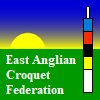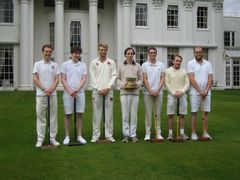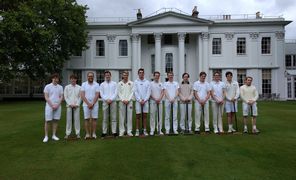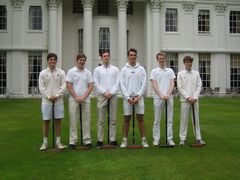

It was a damp and chilly morning at Hurlingham when the two varsity teams arrived for their annual contest. Play started at about 10:20, and so did the rain; but it didn't dampen the enthusiasm of the players.
As usual on these occasions, the match started with three games of doubles, with both teams cautiously manoeuvring for position and both having their plans foiled by opponents hitting in. So it was a full 15 minutes before anyone scored a hoop point in any of the games. Douglas Buisson in the second Cambridge pair finally broke the impasse by peeling his partner through 1, the weather rewarded him by turning the drizzle into a downpour, and a pair of geese arrived to enjoy the fun.
The top players in each team were obviously more focussed on helping their partners rather than making their own breaks, and so progress continued slowly on all three courts. After an hour on the top court it was tied with Cambridge and Oxford having made just 3 hoops each, on the second court just 3 and 1 respectively, and on the third it was also tied on just 4. Then finally on the third court after about 90 minutes Edward Linscott (Cambridge) embarked on a break, making 7 hoops before missing a short return roquet after 3-back and thereby sparing his opponents the trouble of trying to hit in with a long leave shot. It probably wouldn't have mattered, though, because Oxford's Tom "dead-eye" Harmer had already demonstrated his unerring ability to roquet at any distance, a talent which would make him rich if he could bottle and sell it.
Meanwhile on the other courts partners had been navigated through a few more hoops, and as the end of the second hour approached with the weaker partners in both teams on the top court having made 5 or 6 hoops, James Brind (Cambridge) finally decided it was time for him to embark on his own break. He organised the four balls accordingly - and then missed a short return roquet after making 1. At this point the Cambs vs. Oxford hoop count was respectively 6-9 on the top court, 5-4 on the second and, thanks to Edward's break, 12-6 on the third. James soon had other opportunities for progress, however, until that progress was interrupted by another missed return roquet after 2-back. With a lift, a ball waiting in corner III and time running out, his Oxford opponent Mark van Loon seized his opportunity and embarked on his own 4-ball break - only for disaster to strike when he missed his pivot on the way to 1-back. James then managed to make another couple of hoops, and time ran out with the hoop count at 15-12 in Cambridge's favour. On the second and third courts it was even closer, but in spite of a late rally from Oxford on the third court it ended with the hoop counts respectively 9-8 and 12-11, both in Cambridge's favour. So 3-0 to Cambridge at lunch.
The lunchtime alcohol did an excellent job of settling the players' nerves before the afternoon singles, and the rain helped by stopping as well. Indeed a suggestion was overheard that next year the players should start the day with a few bottles of a suitable intoxicant to help them get going faster in the morning doubles too.
The first singles game was between James Brind (2), the only Cambridge player with an official handicap, and Mark van Loon (-½). A supershot from Mark was followed by a ball near corner II from James, Mark's second ball also near II, and a hit by James. James was away, but then croqueted a ball off the court after making 1. Mark took over, this time establishing and taking his 4-ball break to 4-back with a slightly untidy OSL after getting a bit out of shape towards the end of the break. James missed the short lift shot, but Mark was unable to capitalise on it straight away, and for a while both players failed to establish breaks until finally Mark succeeded in getting going again. He didn't have enough control early enough to attempt a regular triple, so by the time he had navigated his second ball round to 4-back he set up for an attempt at a straight triple instead (see photos). The peelee sailed through from about 1 yard straight, but striker's ball mis-approached and had to run away. So the end of Mark's break, but it wasn't long before he was back in again, this time taking his 4-back ball to peg with a decent leave and a posthumous penult peel en route. James then missed another short lift shot leaving Mark to finish +18, and first blood to Oxford in the singles.
In the second game the Oxford captain Mark Baker had started well, taking an early break to 3-back. Your reporter remarked to match referee Ian Plummer that Mark seemed to be playing well, to which Ian replied "he practises triples". That would explain it. Although Mark's opponent Douglas Buisson made some progress he was always behind, and Mark eventually completed another break to finish +14 and give Oxford the second singles win. So the match score was now 3-2 to Cambridge with 4 games still in play, and the match was wide open.
In the third contest, Edward Linscott (Cambs) managed to make good progress with breaks of a few hoops here and there, while his opponent Tom Harmer repeatedly interfered by hitting in from everywhere. If Tom's judgement of length had been as accurate as his line he would have done much better, but he wasn't able to capitalise enough on the opportunities he created, and when time was finally called he was trailing by 7 hoops.
In the other 3 games when the time limit was reached Dan McKavanagh (Oxford) had established a good 7-hoop lead over Christopher Valentine who had substituted for Otto Pyper at lunchtime, bring the match tally to 4-3 in Cambridge's favour. But at the same time Arthur Henderson (Cambs) had also established a good 8-hoop lead over Harry Anderton, and that was sufficient to clinch the match for Cambridge. Meanwhile the final game between Ollie Gardner (Oxford) and Nathan Procter (Cambs) was very close, and when time was called the scores were level. So a sudden death finish. But Nathan had an unexpected wiring lift for his 1-back ball! He hit the 5-yarder which it left him, allowing him to get a dolly 7-yard rush to his hoop on an opponent's ball - which was also for 1-back, dangerous! But he kept his nerve and made the hoop to win +1 on time and bring the final match tally to 6-3 for Cambridge.
All players and spectators were very grateful to the Hurlingham club and its members for once again hosting a most enjoyable and entertaining match.
 The Cambridge team |
 The players |
 The Oxford team |
|
Photo gallery |
Scores (Cambridge names first) | |
|---|---|---|
|
all games Level Advanced
|
See also:
Oxford University Association Croquet Club
Cambridge University Association Croquet Club